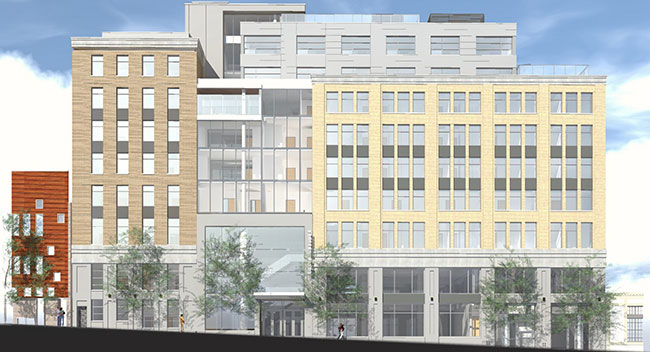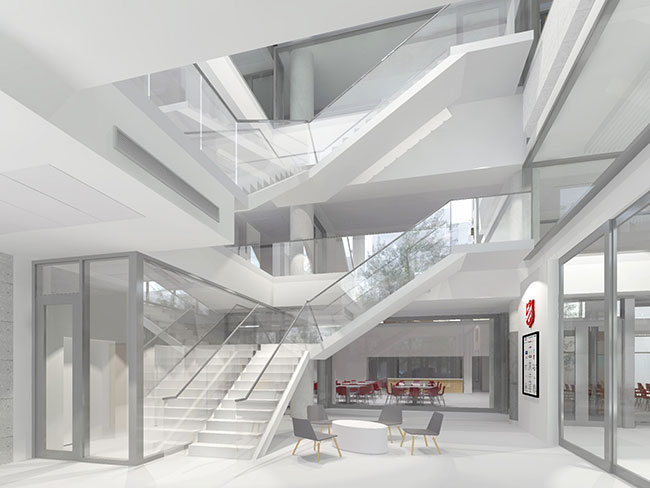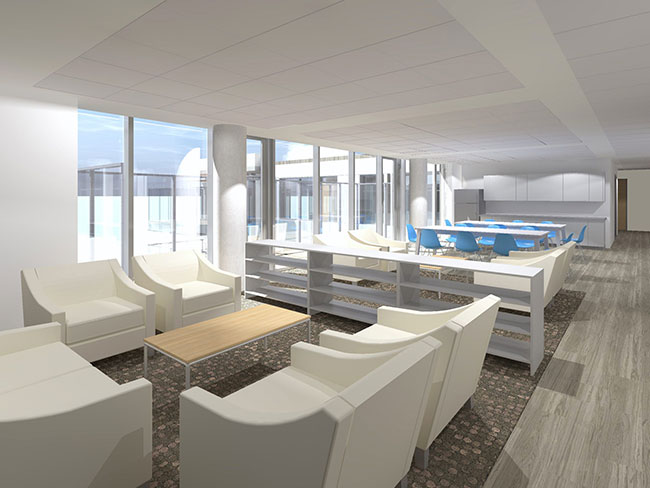People experiencing or at risk of homelessness in Vancouver will soon have access to 300 new affordable rentals, shelter beds, and supportive homes — along with enhanced services — as construction progresses on a new Vancouver Salvation Army Harbour Light facility. The federal and provincial governments are providing nearly $60 million towards the new building in Vancouver.
The Salvation Army’s Harbour Light project is relocating to 130 East Cordova. This project is a partnership between the federal government, through the Canadian Mortgage and Housing Corporation (CMHC) and Correctional Service of Canada, the Province, through BC Housing, the City of Vancouver, and the Salvation Army. Once complete, it will replace and expand capacity of the current Harbour Light building at 119 East Cordova, which is in need of repair.
The new nine-storey building will be made up of 300 units, including 134 year-round shelter spaces, 70 supportive homes, 46 affordable rentals, and 50 correctional beds. The new facility will also include a community programming space.
Construction is underway and expected to complete in 2026. During construction, the Salvation Army will continue to operate Harbour Light out of the current location and a temporary shelter location on East Hastings.
The new development will allow the Salvation Army to continue the mission of Harbour Light to provide emergency shelter and transition facilities in Vancouver’s Downtown Eastside (DTES) that enable clients to regain their health, obtain shelter, participate in substance-use recovery programs, access affordable housing, build employment skills and re-establish community connections.
Funding for this project includes:
- $27.2 million from the federal government, including $23.6 million through the Affordable Housing Fund and $3.6 million from Correctional Service of Canada
- $29.6 million from the Province of British Columbia, through BC Housing’s Supportive Housing Fund for the 57 new supportive homes
- $43.6 million contribution and the land for the project from the Salvation Army
- The City of Vancouver is providing $756,000 in fee waivers and a Community Housing Incentive Program (CHIP) grant funding totalling $910,000
Quotes:
“Today’s announcement demonstrates how the federal government is working with partners from all levels of government and non-profit organizations to create a safe environment where individuals can receive the necessary supports they need in order to thrive. This mix of shelter beds and affordable homes will give Vancouver’s most vulnerable residents a place to recover, rebuild and thrive. This is another way that the National Housing Strategy ensures that no one is left behind.”
“The new Harbour Light facility will offer additional safe housing options to people who need it most in the DTES. This project is an example of what can be realized when partners work together to help address the complex challenges faced by people experiencing homelessness in Vancouver — and this important work is ongoing as committed in the Belonging in BC homelessness plan.”
“People experiencing or at risk of homelessness are better able to gain stability when they have access to affordable housing and essential supports, such as health services and employment. The new Harbour Light facility and the retention of the old one means that more homes will be accessible, and services will continue to be available to people who need it most. Thanks to involved partners, people in the community will not be left on their own in their path to recovery and stability.”
“The Vancouver Harbour Light housing project is a significant step forward in our ongoing efforts to support the most vulnerable members in our community. By providing safe, affordable housing and essential services, we’re creating a foundation for stability and recovery for those in the Downtown Eastside. We’re proud to support the work of local non-profits who play an important role in delivering supportive and affordable housing in Vancouver.”
“The new Vancouver Harbour Light facility will allow us to continue to provide hope to those in need in the Downtown Eastside for years to come. With safe and welcoming social, living and learning spaces, the new and exciting purpose-designed residential facility will enhance our existing comprehensive continuum-of-care model, further serve our client’s diverse needs, and provide new opportunities for the skills and personal development necessary for lasting transformation. We are also pleased that our new building will include a dedicated space for women, offering specialized services and supports tailored to the unique needs of women experiencing homelessness and substance use.”
Quick facts:
- The Affordable Housing Fund (AHF) is part of Canada’s National Housing Strategy (NHS), an $82+ billion plan to give more Canadians a place to call home. Progress on programs and initiatives are updated quarterly at http://www.placetocallhome.ca.The Housing Funding Initiatives Map shows affordable housing projects that have been developed.
- As of March 2024, the federal government has committed $50.97 billion to support the creation of over 146,000 units and the repair of over 286,000 units These measures prioritize those in greatest need, including seniors, Indigenous Peoples, people experiencing or at risk of homelessness, and women and children fleeing violence.The Affordable Housing Fund, provides funding through contributions or low-interest and/or forgivable loans to partnered organizations for new affordable housing and the renovation and repair of existing, affordable and community housing. This is a $13.2 billion program under the National Housing Strategy (NHS) that gives priority to projects that help people who need it most, including women and children fleeing family violence, seniors, Indigenous peoples, people living with disabilities, those with mental health or addiction issues, veterans, and young adults.
- As of December 31, 2023, the Government of Canada has committed over $8.17 billion to support the creation of over 32,000 units and the repair of over 155,000 units through the Affordable Housing Fund.
- The project is part of a $19-billion housing investment by the B.C. government. Since 2017, the Province has delivered nearly 80,000 homes that have been delivered or are underway, including more than 8,500 in Vancouver.
- The Province has provided a $29.6-million equity contribution through BC Housing’s Supportive Housing Fund, and BC Housing will retain ownership of the 57 supportive housing units upon completion.
Additional information:
Visit Canada.ca/housing for the most requested Government of Canada housing information.
CMHC contributes to the stability of the housing market and financial system, provides support for Canadians in housing need, and offers unbiased housing research and advice to all levels of Canadian government, consumers and the housing industry. CMHC’s aim is that everyone in Canada has a home they can afford and that meets their needs. For more information, follow us on Twitter, Instagram, YouTube, LinkedIn and Facebook.
To find out more about the National Housing Strategy, please visit www.placetocallhome.ca.
To learn about B.C.’s new Homes for People action plan, visit: https://news.gov.bc.ca/releases/2023HOUS0019-000436.
To learn about the steps the Province is taking to tackle the housing crisis and deliver affordable homes for British Columbians, visit: https://strongerbc.gov.bc.ca/housing/.
For information on this news release contact:
Micaal Ahmed
Office of the Minister of Housing, Infrastructure and Communities
micaal.ahmed@infc.gc.ca
Media Relations
Canada Mortgage and Housing Corporation
media@cmhc-schl.gc.ca
Ministry of Housing
Media Relations
236-478-0251
BC Housing
Media Relations
media@bchousing.org

The new Vancouver Harbour Light will be located at 130 E Cordova Street.

The new nine-storey building will be made up of 300 units, including 134 year-round shelter spaces, 70 supportive homes, 46 affordable rentals, and 50 correctional beds.

There will be spaces that enable professional staff to offer holistic care to the community.

The building will have flexible spaces to support day-to-day living, conflict resolution, employment and more.






 Share via Email
Share via Email
